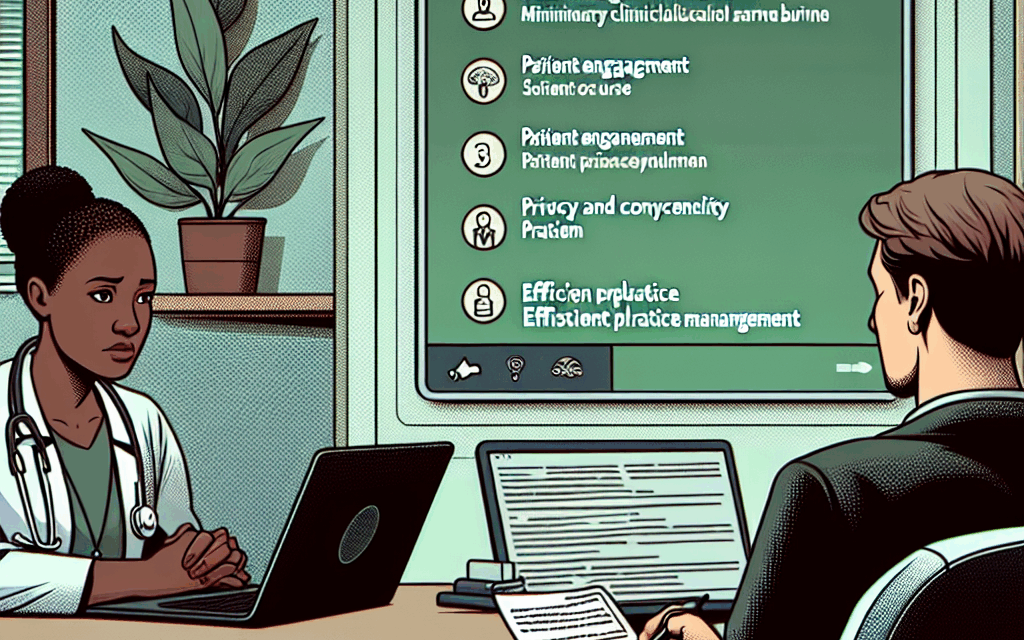Five Common Challenges Addressed by an AI Scribe in Psychiatry for Clinicians
The integration of artificial intelligence (AI) into healthcare has revolutionized various fields, and psychiatry is no exception. AI scribes, in particular, have emerged as valuable tools for clinicians, addressing several challenges that hinder effective patient care. This article explores five common challenges faced by psychiatrists and how AI scribes can help mitigate these issues, ultimately enhancing the quality of care provided to patients.
1. Documentation Burden
One of the most significant challenges faced by psychiatrists is the overwhelming burden of documentation. Clinicians often spend a considerable amount of their time on administrative tasks, including writing notes, updating patient records, and ensuring compliance with regulations. This documentation burden can detract from the time available for direct patient care, leading to burnout and decreased job satisfaction.
AI scribes can alleviate this burden by automating the documentation process. By utilizing natural language processing (NLP) and machine learning algorithms, AI scribes can transcribe conversations between clinicians and patients in real-time. This technology allows psychiatrists to focus on their patients rather than being bogged down by paperwork.
For instance, a study published in the Journal of the American Medical Association (JAMA) found that physicians spend nearly two hours on administrative tasks for every hour spent with patients. By implementing AI scribes, clinicians can significantly reduce this ratio, allowing them to dedicate more time to patient interactions.
Moreover, AI scribes can ensure that documentation is accurate and comprehensive. They can capture essential details from patient interactions, including symptoms, treatment plans, and follow-up recommendations. This level of detail is crucial for maintaining continuity of care and ensuring that all members of the healthcare team are informed about a patient’s progress.
- Reduction in time spent on documentation
- Increased focus on patient care
- Improved accuracy and comprehensiveness of records
In summary, the documentation burden is a significant challenge in psychiatry that can lead to clinician burnout and reduced patient care quality. AI scribes offer a solution by automating documentation, allowing psychiatrists to focus on what matters most—their patients.
2. Enhancing Patient Engagement
Patient engagement is a critical component of effective psychiatric care. Engaged patients are more likely to adhere to treatment plans, attend follow-up appointments, and communicate openly with their clinicians. However, many psychiatrists struggle to foster meaningful engagement due to time constraints and the complexities of mental health conditions.
AI scribes can play a pivotal role in enhancing patient engagement by facilitating more interactive and personalized sessions. By handling the documentation process, AI scribes allow clinicians to maintain eye contact and engage more fully with their patients. This shift in focus can lead to improved rapport and trust between the clinician and the patient.
Furthermore, AI scribes can assist in gathering patient feedback during sessions. For example, they can prompt clinicians to ask specific questions about a patient’s feelings or experiences, ensuring that important topics are addressed. This proactive approach can help patients feel heard and valued, ultimately leading to better treatment outcomes.
Research has shown that patient engagement is linked to improved mental health outcomes. A study published in the American Journal of Psychiatry found that patients who actively participated in their treatment decisions experienced lower levels of anxiety and depression. By using AI scribes to enhance engagement, psychiatrists can empower their patients and foster a collaborative therapeutic relationship.
- Improved clinician-patient rapport
- Increased patient participation in treatment decisions
- Enhanced communication and trust
In conclusion, enhancing patient engagement is a vital challenge in psychiatry. AI scribes can help clinicians create a more interactive and personalized experience for their patients, leading to better treatment adherence and improved mental health outcomes.
3. Managing Complex Patient Histories
Psychiatric patients often present with complex histories that include multiple diagnoses, medications, and treatment modalities. Managing these intricate cases can be overwhelming for clinicians, especially when trying to keep track of all relevant information. Inaccurate or incomplete patient histories can lead to misdiagnosis, inappropriate treatment plans, and ultimately, poor patient outcomes.
AI scribes can assist clinicians in managing complex patient histories by organizing and synthesizing information from various sources. By integrating data from electronic health records (EHRs), previous treatment notes, and patient-reported outcomes, AI scribes can create a comprehensive overview of a patient’s history. This holistic view enables clinicians to make informed decisions about treatment options and adjustments.
For example, an AI scribe can flag potential drug interactions based on a patient’s current medications and past prescriptions. This feature is particularly valuable in psychiatry, where polypharmacy is common. A study published in the Journal of Clinical Psychiatry found that nearly 60% of psychiatric patients were prescribed multiple medications, increasing the risk of adverse effects and complications. By providing clinicians with real-time insights into a patient’s medication history, AI scribes can help mitigate these risks.
- Comprehensive overview of patient histories
- Identification of potential drug interactions
- Informed decision-making for treatment plans
In summary, managing complex patient histories is a significant challenge in psychiatry. AI scribes can streamline this process by organizing and synthesizing information, ultimately leading to better-informed treatment decisions and improved patient safety.
4. Ensuring Compliance with Regulations
Compliance with regulations and standards is a critical aspect of psychiatric practice. Clinicians must adhere to various guidelines, including those set forth by the Health Insurance Portability and Accountability Act (HIPAA) and the Centers for Medicare & Medicaid Services (CMS). Failure to comply with these regulations can result in legal repercussions, financial penalties, and damage to a clinician’s reputation.
AI scribes can help ensure compliance by automating the documentation process and incorporating compliance checks into their workflows. For instance, AI scribes can flag any missing information that is required for compliance, such as consent forms or treatment plans. This proactive approach can help clinicians avoid potential pitfalls and maintain adherence to regulatory standards.
Moreover, AI scribes can assist in generating reports that demonstrate compliance with quality measures. For example, they can compile data on patient outcomes, treatment adherence, and follow-up appointments, providing clinicians with the necessary documentation to support their compliance efforts. A study published in the Journal of Healthcare Management found that organizations that utilized technology to streamline compliance processes experienced a 30% reduction in compliance-related issues.
- Automated compliance checks
- Streamlined documentation for regulatory requirements
- Improved reporting on quality measures
In conclusion, ensuring compliance with regulations is a significant challenge in psychiatry. AI scribes can help clinicians navigate this complex landscape by automating documentation and providing valuable insights into compliance efforts, ultimately reducing the risk of legal and financial repercussions.
5. Addressing Burnout and Job Satisfaction
Burnout is a pervasive issue in the field of psychiatry, with studies indicating that nearly 50% of psychiatrists experience symptoms of burnout. Factors contributing to this phenomenon include high caseloads, administrative burdens, and emotional exhaustion from working with patients facing severe mental health challenges. Burnout not only affects clinicians’ well-being but also impacts the quality of care provided to patients.
AI scribes can play a crucial role in addressing burnout by alleviating some of the administrative burdens that contribute to clinician stress. By automating documentation and streamlining workflows, AI scribes allow psychiatrists to focus on their patients and reduce the time spent on non-clinical tasks. This shift can lead to increased job satisfaction and a renewed sense of purpose in their work.
Furthermore, AI scribes can help create a more balanced workload for clinicians. By efficiently managing documentation and providing insights into patient histories, AI scribes can enable psychiatrists to prioritize their time and energy more effectively. A study published in the Journal of Psychiatric Practice found that clinicians who utilized AI tools reported a 40% reduction in feelings of burnout and an increase in overall job satisfaction.
- Reduction in administrative burdens
- Increased focus on patient care
- Improved job satisfaction and reduced burnout
In summary, addressing burnout and job satisfaction is a critical challenge in psychiatry. AI scribes can help mitigate these issues by streamlining workflows and allowing clinicians to focus on their patients, ultimately leading to a healthier work environment and improved patient care.
Conclusion
The integration of AI scribes into psychiatric practice offers a promising solution to several common challenges faced by clinicians. From alleviating the documentation burden to enhancing patient engagement, managing complex histories, ensuring compliance, and addressing burnout, AI scribes have the potential to transform the way psychiatrists deliver care.
As the field of psychiatry continues to evolve, embracing technology like AI scribes will be essential for improving patient outcomes and clinician satisfaction. By leveraging these tools, psychiatrists can focus on what truly matters—providing compassionate and effective care to their patients.
In conclusion, the future of psychiatry is bright with the integration of AI technology. By addressing the challenges outlined in this article, AI scribes can help create a more efficient, effective, and compassionate mental health care system.





